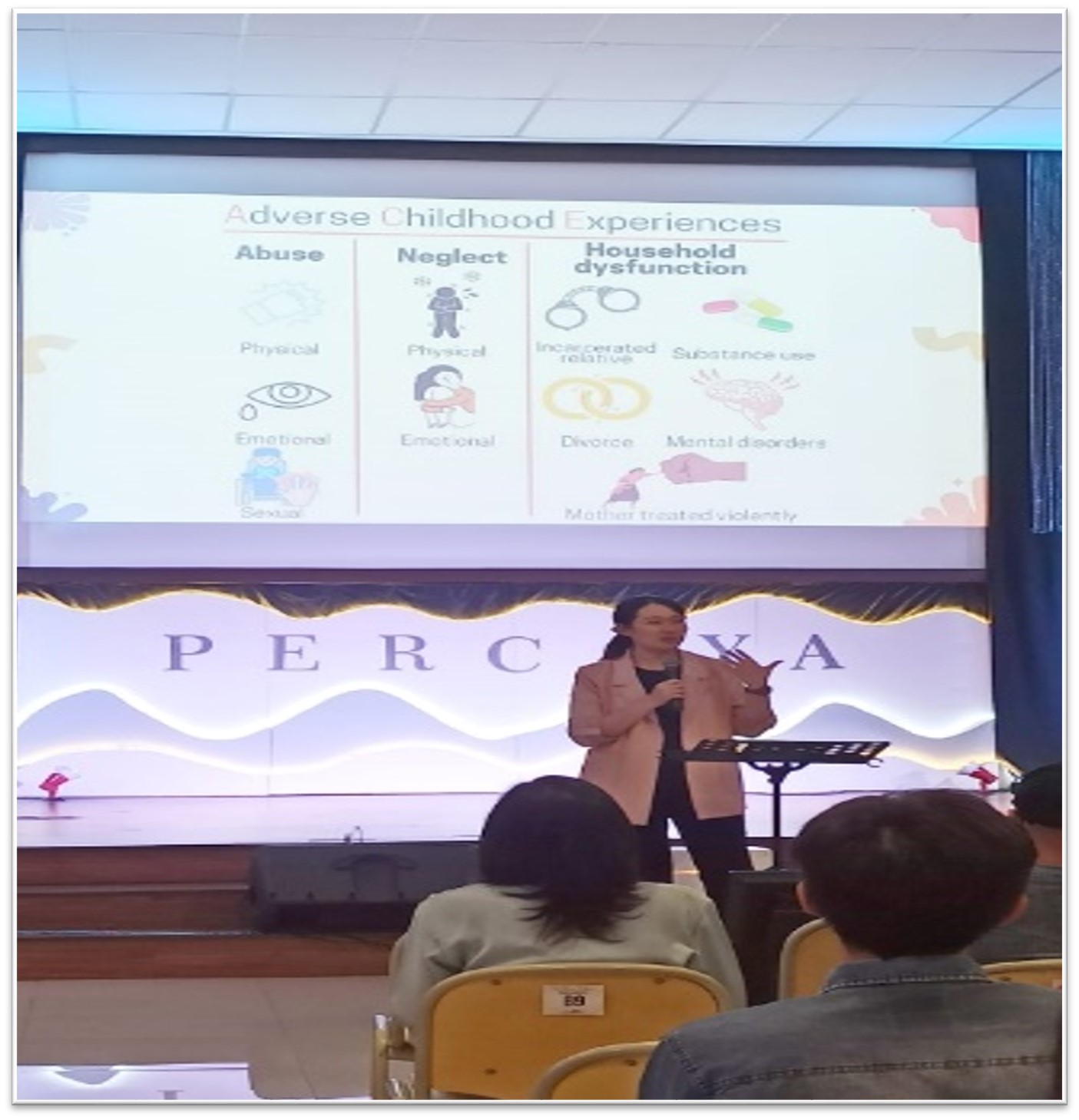EDUKASI PERAN ORANG TUA DALAM PEMBENTUKKAN INNER CHILD MELALUI REGULASI EMOSI ANAK DI GEREJA BACB
DOI:
https://doi.org/10.47457/jps.v5i1.449Keywords:
emotion regulation, inner child, parent parentingAbstract
The inner child is a part of someone's life that is formed from the time of conception until the age of 12. Therefore, parents play a crucial role in shaping the inner child. If someone has a wounded inner child, it will manifest unconsciously throughout adulthood, both in actions and feelings. One thing a parent can do is regulate their child's emotions. An educational class for parents held at the Bandung City Blessing City Square Church aims to raise awareness regarding the importance of understanding the inner child and emotional regulation in children. The research method used is descriptive qualitative, where the author conducted a literature study to present the material for this educational class. Doing this activity resulted in participants giving positive responses, indicating that the class provided knowledge and skills that can be directly applied. Participants also suggested that educational courses should be conducted regularly and counselling should be available for parents to enhance their parenting abilities further.
Downloads
References
Bradshaw, J. (2013). Homecoming: Reclaiming and Healing Your Inner child . Random House Publishing Group.
Cabrera, N. J., Karberg, E., Malin, J. L., & Aldoney, D. (2017). The Magic of Play: Low-Income Mothers’ and Fathers’ Playfulness and Children’s Emotion Regulation and Vocabulary Skills. Infant Mental Health Journal. https://doi.org/10.1002/imhj.21682
Chen, P. (2022). Inner child of the past: long-term protective role of childhood relationships with mothers and fathers and maternal support for mental health in middle and late adulthood. Social Psychiatry and Psychiatric Epidemiology. https://doi.org/10.1007/s00127-021-02200-y
Dewi, E. M. P., Putri, R. F. D., Sulistiawati, S., Musdalifa, M., Syam, U., Safaruddin, N. U., & Dwianri, N. J. P. (2023). Mengenali Inner child Untuk Berdamai dengan Luka Masa Kecil. Madaniya, 4(2 SE-Artikel), 640–648. https://doi.org/10.53696/27214834.356
Diana, R. (2019). Prinsip Teologi Kristen Pendidikan Orang tua terhadap Anak di Era Revolusi Industri 4.0. BIA’: Jurnal Teologi Dan Pendidikan Kristen Kontekstual. https://doi.org/10.34307/b.v2i1.79
Edwards, A. (2023). Flooded. (R. K. Agatha, Ed.) (1st ed.). Jakarta: PT. Elex Media Komputindo.
Goleman, D. (2009). Kecerdasan Emosional. Gramedia Pustaka Utama.
Gottman, J. M., & Declaire, J. (1997). Raising An Emotionally Intelligent Child. Simon & Schuster.
Havighurst, S., & Kehoe, C. (2017). The role of parental emotion regulation in parent emotion socialization: Implications for intervention. In Parental Stress and Early Child Development: Adaptive and Maladaptive Outcomes. https://doi.org/10.1007/978-3-319-55376-4_12
Hestbech, A. M. (2018). Reclaiming the inner child in cognitive-behavioral therapy: The complementary model of the personality. American Journal of Psychotherapy. https://doi.org/10.1176/appi.psychotherapy.20180008
Hughes, K., Bellis, M. A., Hardcastle, K. A., Sethi, D., Butchart, A., Mikton, C., … Dunne, M. P. (2017). The effect of multiple adverse childhood experiences on health: a systematic review and meta-analysis. The Lancet Public Health. https://doi.org/10.1016/S2468-2667(17)30118-4
Katz, L. F., Maliken, A. C., & Stettler, N. M. (2012). Parental Meta-Emotion Philosophy: A Review of Research and Theoretical Framework. Child Development Perspectives. https://doi.org/10.1111/j.1750-8606.2012.00244.x
Marbun, N. (2021). Keteladanan Orang Tua Dalam Pembentukan Karakter Anak Usia 0-6 Tahun. KERUGMA: Jurnal Teologi Dan Pendidikan Agama Kristen.
Morris, A. S., Silk, J. S., Steinberg, L., Myers, S. S., & Robinson, L. R. (2007). The role of the family context in the development of emotion regulation. Social Development. https://doi.org/10.1111/j.1467-9507.2007.00389.x
Mufidah, E. F., Saloka, R., & Isya, W. (2020). Inner child : Dalam Pandangan Konseling Analisis Transaksional. Prosiding Seminar Dan Lokakarya Nasional Bimbingan Dan Konseling.
Qodariah, L., Pebriani, L. V., & Ashriyana, R. (2022). Memahami Emosi Manusia : Perkembangan Emosi pada Bayi dan Anak. Bandung: PT. Alumni.
Selvieana Indrawati, & Tambunan, A. (2023). Analisis Deskriptif Pola Asuh Otoriter dan Pola Asuh Otoritatif berdasarkan Efesus 6:4. YADA : Jurnal Teologi Biblika Dan Reformasi, 1(2 SE-Articles), 57–70. Retrieved from https://journal.sttpadonaybatu.ac.id/index.php/YJTBR/article/view/22
Stahl, S. (2015). The Child in You: The Breakthrough Method for Bringing out Your Authentic Self. Penguin Books. New York: Penguin Publishing Group.
Tanusaputra, D. N. (2005). Teologi Pernikahan dan Keluarga. Veritas: Jurnal Teologi Dan Pelayanan. https://doi.org/10.36421/veritas.v6i1.144
Wati, D. E., & Puspitasari, I. (2018). Kekerasan Terhadap Anak, Penanaman Disiplin, dan Regulasi Emosi Orang Tua. Jurnal VARIDIKA. https://doi.org/10.23917/varidika.v30i1.6541

Downloads
Published
How to Cite
Issue
Section
License
Copyright (c) 2024 Jurnal PKM Setiadharma

This work is licensed under a Creative Commons Attribution-ShareAlike 4.0 International License.
Authors who publish with this journal agree to the following terms:
- Authors retain copyright and grant the journal right of first publication with the work simultaneously licensed under a Creative Commons Attribution License that allows others to share the work with an acknowledgement of the work's authorship and initial publication in this journal.
- Authors are able to enter into separate, additional contractual arrangements for the non-exclusive distribution of the journal's published version of the work (e.g., post it to an institutional repository or publish it in a book), with an acknowledgement of its initial publication in this journal.
- Authors are permitted and encouraged to post their work online (e.g., in institutional repositories or on their website) prior to and during the submission process, as it can lead to productive exchanges, as well as earlier and greater citation of published work (See The Effect of Open Access).











